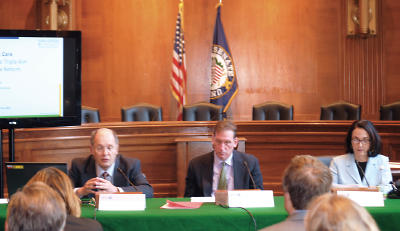Decades of research—including more than 80 clinical trials—have proven that a collaborative care model of health care works. It is an effective and efficient model that can achieve the “Triple Aim” in medicine: improved patient experience, better patient outcomes across populations, and cost savings.
Yet this proven approach remains underutilized in practice. Some obstacles are due to logistics such as developing appropriately trained providers—an issue APA is addressing by training around 3,500 psychiatrists in collaborative care over the next four years as part of the Centers for Medicare and Medicaid Services (CMS) Transforming Clinical Practice Initiative (
Psychiatric News, February 5).
But one significant barrier is the lack of reimbursement for providing care in such integrated care models that do not pay on a traditional fee-for-service basis.
Overcoming this barrier will require the cooperation of the federal government, and last month APA held a congressional briefing to help raise awareness about the collaborative care model and its value.
“This model is considered by many authorities as a best practice,” said APA President Renée Binder, M.D., who led the expert panel. “And we urge Congress to support the effort of groups like CMS and recognize collaborative care as a payment-eligible practice.”
She was joined by Jürgen Unützer, M.D., M.P.H., professor and chair of psychiatry at the University of Washington and an internationally recognized pioneer of the collaborative care movement, and David Roll, M.D., an internist and pediatrician at the Revere Family Health Center in Cambridge, Mass., which recently adopted this type of model in its practice.
In his presentation, Unützer highlighted some of the stark truths about mental illness and mental health services that necessitate the need for better care models. “Every day there are more suicides than homicides or motor vehicle accidents—it’s just that they rarely make the news,” he said. “But these data are just as compelling and deserve more attention from policymakers.”
He also pointed out that more than half of the counties in the United States do not have a practicing psychiatrist or psychologist, but even where help is more readily available, services like mental health clinics, substance use centers, and social services are often poorly coordinated.
“Training more experts is important, but not enough by itself,” he said. “We need to leverage collaboration and technology to succeed.”
Roll discussed his experience as someone who got involved in this arena from outside the mental health profession. He said that integrating care at Revere has been a boon to his patient base, which is predominantly people of lower socioeconomic status.
“Too often patients I referred to a psychiatrist would not be seen for weeks afterward, at which point it was too late to adequately address the problem,” he said. Now, a staff psychiatrist is readily available to consult through the use of telemedicine—one common way technology is shaping collaborative care.
As to whether research data and success stories like Revere and Washington state’s Mental Health Integration Program (MHIP) will sway Congress remains to be seen, but Sen. Ben Cardin (D-Md.), who serves on the Senate Finance Subcommittee on Health Care, did provide some optimism—sprinkled with heavy caution.
“This is an area that brings the political parties together,” he told the audience. “But the reality also is that budgets are tight.”
A key success, he said, would be to persuade Congress to change how it conducts legislative scoring (predicting how much revenue a budget proposal will gain or lose) in regard to collaborative care programs.
“We need to be given the benefit of including the real cost savings that will be seen down the line,” he said. ■


